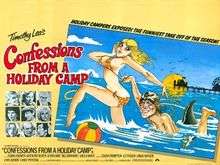Confessions from a Holiday Camp
Confessions from a Holiday Camp is a 1977 British comedy film. It is the last film in the series which began with Confessions of a Window Cleaner. The film was released in North America in 1978 under the title Confessions of a Summer Camp Counsellor.[1]
| Confessions from a Holiday Camp | |
|---|---|
 Promotional poster | |
| Directed by | Norman Cohen |
| Produced by | Greg Smith, Michael Klinger (executive producer) |
| Written by | Christopher Wood |
| Starring | Robin Askwith Antony Booth Bill Maynard Doris Hare Sheila White |
| Music by | Ed Welch |
| Cinematography | Ken Hodges |
| Edited by | Geoffrey Foot |
| Distributed by | Columbia Pictures Corporation |
Release date |
|
Running time | 88 minutes |
| Country | United Kingdom |
| Language | English |
Plot
Timmy Lea and his brother-in-law Sidney Noggett are working as entertainment officers at Funfrall, a typical British holiday camp. The staff are lazy and inefficient, preferring to laze by the pool rather than organise activities for the holiday campers. A new owner, Mr. Whitemonk, an ex-prison officer, takes over the camp and is determined to install discipline into the staff. He is on the verge of dismissing Timmy and Sidney; however, Sidney's suggestion of organising a beauty contest changes his mind.
Producer Michael Klinger was not happy with the script, noting a number of problems that he felt detracted from the quality that set the series apart from its imitators.
Cast
Cast overview, first billed only:
- Robin Askwith .... Timmy Lea
- Antony Booth .... Sidney Noggett
- Bill Maynard .... Mr. Lea
- Doris Hare .... Mrs. Lea
- Sheila White .... Rosie Noggett
- Linda Hayden .... Brigitte
- Lance Percival .... Lionel
- John Junkin .... Mr. Whitemonk
- Liz Fraser .... Mrs. Antonia Whitemonk
- Colin Crompton .... Roughage
- Nicola Blackman .... Blackbird
- Nicholas Bond-Owen .... Kevin (as Nicholas Owen)
- Caroline Ellis .... Gladys
- Sue Upton .... Renee
- Penny Meredith ... Married Woman
- Mike Savage .... Kevin's Dad
- Janet Edis .... Kevin's Mum
- Deborah Brayshaw ... Go Cart Girl
- Kim Hardy ... Announcer
- David Auker ... Alberto Smarmi
- John Bryant ... Young Man
- Charlie Stewart ... Piper
- Carrie Jones ... Bikini Girl
- Julia Bond ... Bikini Girl
- Betty Hare ... Mourner
- Winifred Braemar ... Mourner
- Margo Field ... Mrs. Dimwiddy
- Marianne Stone ... Waitress
- Leonard Woodrow ... Chaplain
- Lauri Lupino Lane ... Mayor
- Ingrid Bower ... Holiday Maker
- Robert Booth ... Holiday Maker
- Michael Segal ... Holiday Maker
- Matt Kilroy ... Chauffeur
Production
The holiday camp used in the film was Mill Rythe Holiday Village on Hayling Island in Hampshire.
The railway station scene was filmed at Radlett.
Soundtrack
The title track to the film was called Give Me England and was performed by scrumpy and western band, The Wurzels, arranged and conducted by Ed Welch and produced by Bob Barratt.[2] It was released on 45 by EMI records Ltd (EMI 2677). The Wurzels released an album of the same name in 1977, which featured the track along with its B-Side "Speedy Gonzales".
Further proposed films
Although Holiday Camp would turn out to be the last film in the series, a fifth and a sixth film, Confessions of a Plumber's Mate and Confessions of a Private Soldier, had been planned in 1977. Filming was set to begin on Plumber's Mate at the end of February 1978. Robin Askwith even expressed a desire to direct Private Soldier, but neither film materialised. In November 1977 the studio cancelled plans for future films.[3][4] Columbia Pictures president David Begelman, who had been very supportive of the British film industry and who had green-lit the first Confessions film, had been implicated in a cheque-forging scandal and either quit or was fired. His successor had no interest in financing low-budget, profitable British films.[3]
Producer Michael Klinger rejected a script based on Confessions from a Haunted House. Plans to shoot a made-for-video Confessions film in the 1980s also came to nothing,[3] as did a proposed 1992 film, "Confessions of a Squaddie", which was proposed with action due to take place in post-Gulf War Kuwait.
References
- Powers, Ned (7 April 1978). "At The Movies". The StarPhoenix. Saskatoon, Saskatchewan, Canada. p. 19.
- Jones, Martin Christopher (2001). Psychedelic Decadence: Sex, Drugs, Low Art in Sixties & Seventies Britain. Critical Vision. p. 78. ISBN 9781900486149.
- Askwith, Robin (2012). "Chapter 10: The Further Confessions of a Window Cleaner". The Confessions of Robin Askwith. Random House. p. no page number. ISBN 9781448118687.
- Wood, Christopher (2006). James Bond, The Spy I Loved. Twenty First Century Publishers, Ltd. p. 163. ISBN 978-1-904433-53-8.
Bibliography
- Simon Sheridan (2007). Keeping the British End Up: Four Decades of Saucy Cinema. Reynolds & Hearn Books. ISBN 1-905287-54-2.
External links
- Confessions from a Holiday Camp on IMDb
- Confessions from a Holiday Camp at AllMovie
- Confessions from a Holiday Camp BFI Film & TV Database